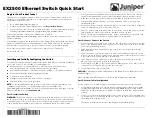
168
Glossary
port forwarding
With port forwarding it is possible to specify ports that will al-
low all incoming or outgoing data packets to pass through a
router or firewall.
If a computer from the local network offers server services, for
instance, the settings of a router using NAT (
) or
IP masquerading (
) must enable or forward the
port used by the server service for access to incoming data
packets and thus keep it open permanently. The private IP ad-
dress of the given computer must be saved as the destination
address for all of the packets arriving at the port.
Typical server applications that require port forwarding are
FTP and Web servers. To allow access to a computer via re-
mote management software like Symantec pcAnywhere or Mi-
crosoft’s Remote Desktop, or even use of a file-sharing pro-
gram like eDonkey, the required ports must be released for
port forwarding. Port forwarding settings for the most impor-
tant application cases are quite simple as long as the set-
tings of the router or the firewall already contain rules with a
corresponding preconfiguration.
private IP address
Private IP addresses are used for computers and other net-
work devices within local IPv4 networks.
Since many local IP networks are not connected to the Inter-
net except via single computers or routers (gateway), certain
address ranges are excluded from the publicly available IP
addresses so that they are available for assignment in local IP
networks. An IP address may only be assigned once within
the local network. A private IP address may exist in any num-
ber of other local networks.
public IP address
A public IP address is an IP address (
) valid in the
Internet. Every computer or router participating in the Internet
must have a uniquely assigned public IP address. This ad-
dress is usually negotiated dynamically with the Internet Ser-
FRITZ!Box_7360-en.fm Seite 168 Mittwoch, 15. Februar 2012 5:21 17













































